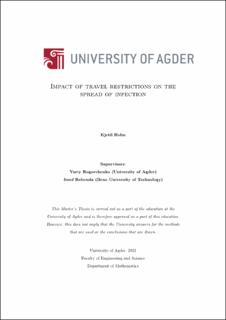Impact of travel restrictions on the spread of infection
Abstract
With the outbreak of Covid-19 it has become more important to know howto deal with a large scale epidemic effectively. Governments utilize differentmethods to try and contain the spread of viruses, to different results. But whatdoes modeling say about the way to approach the problem? The purpose ofthe thesis is to introduce a modification of a popular SIR model for the spreadof infectious diseases which allows to explore the impact of travel. The groupof susceptible individuals S is split into two subgroups in accordance with thetravel patterns: S1 (traveling individuals) and S2 (not traveling individuals).Stability properties of infection-free and endemic equilibria are studied withrespect to the basic reproduction number. Numerous numerical simulationsillustrate the dynamics of the system, including its modifications based on theintroduction of the delayed argument. The results of the theoretical analysisand numerical simulations are compared to the recent empirical data to providepractical advice to local and governmental policy makers.
